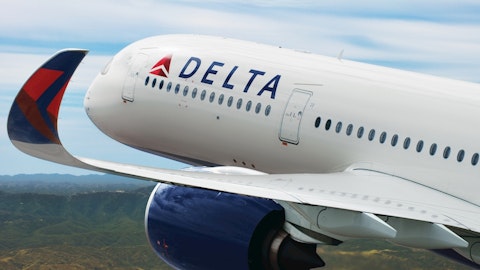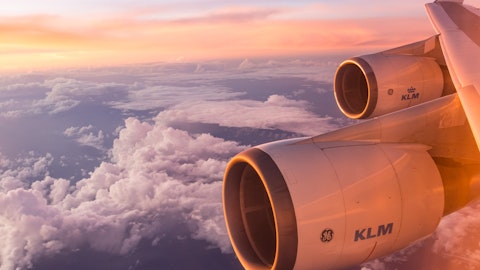Michael O’Leary: Thanks, Johannes. Next question, please.
Operator: Thank you. We have time for one further question that comes from the line of Harry Gowers at JPMorgan. Please go ahead. Your line is open.
Michael O’Leary: Good morning, Harry.
Harry Gowers: Hi. Good morning. Yeah. Just a quick one on ancillaries, if I can. So obviously, it continues to go well. So any early thinking on how much year-on-year growth, if you can maybe squeeze out of ancillary per pax in year-end to March ’24? Thanks.
Michael O’Leary: Yeah, I wouldn’t get in too much detail on it. I don’t expect there’ll be much additional growth in ancillaries on a per passenger basis. We expect ancillaries to continue to grow in line or maybe 1 percentage points or 2 percentage points ahead of traffic growth for the next year or two. We are still seeing customers switching into buying those services like the reserved seats priority boarding. We’re certainly beginning to see the start of meaningful growth in duty-free sales on all the routes to and from the U.K. I think that’s been an area where a number of airports who are very focused on adding U.K. routes or connecting U.K. routes because the airports can get advantage of duty free. It’s one thing I’m always made that when an airport like Heathrow is there looking for further cost increases.
John Holland Kaye is very vocal on everything except the benefit Heathrow from these Duty Free sales at the moment. But thankfully, Heathrow is not an airport which we operate. But it’s certainly, I think, going to be — so we would hope to see some additional growth in onboard Duty Free sales on the 40% routes we operate that operate to and from the U.K. But other that, I don’t think there’s anything significant in ancillaries for the next year or two. And certainly, when we finalize the budget between now and the end of March, we would hope to see traffic grow 10% in the next 12 months and ancillaries probably add another 1% or 2% on top of that. It will be a fairly modest budget for ancillary growth. Thanks, Harry. Next question, please.
Operator: Thank you. As there are no further questions, I’ll hand back to Michael for the closing comments.
Michael O’Leary: Okay, folks. So thank you very much for taking part of the call. Again, I think we’ve had a strong Q3. Q4 will be loss-making, which is always helpful. I think we just take some of the irrational exuberance out of this. We are growing strongly. I think Easter and the summer looks good. If I could leave you with any two parting, one parting thought. And that is I would refer you to the slide — investor slide presentation. We put them on the website. Look at Page 4, which is the unit cost gap between us and every other airline in Europe and how that has materially widened during COVID. I think that widening — that cost cap will widen further in the next 12 months, particularly as the competition are paying higher financing and lease costs for their operating leased aircraft.
And the other side to look at is Slide 9, which is the very strong market share gains. We will continue, we think, to take significant market share. We’re going to add between 45 and 51 aircraft in the summer of 2023 in a marketplace where nobody else is adding any capacity. Yes, Weeze are taking some aircraft deliveries. But more — a majority of that is being diverted towards serving routes into the Middle East, which is a market in which we don’t compete. And as long as there are no black swan events and there is a reasonably strong recovery or transatlantic traffic and Asian traffic into Europe in the summer of 2023, then I would be modestly hopeful that we will see a strong first half of FY ’24. Easter will be in Q1. We would hope to see a reasonably strong trading environment into Q2.
As long as it’s not disrupted by French and German ATC, we will be continuing to add capacity. We’ll be continuing to keep fares low or significantly lower than any competitor because we’re the airline delivering growth. And we would hope that, that will result in a second year of strong operating profit for Ryanair in the next 12 months. If it does, we will then be able to fund the pay increases we’re committed to with our crews, our pilots and cabin crew. We will pay down the debt at, the bonds in March and in August. We would hope to get very close to zero net debt by March 2024. And then you have my word speaking as a large shareholder, that we will be addressing shareholder returns in the spring of 2024 as our priority. Thank you very much, everybody.
And Neil is doing a couple of investor meetings in London. I think he’s in London and Frankfurt and Paris in the next three days. If anybody would like a meeting or to attend one of the group meetings that Sydney and Davies are kindly hosting, please contact us through Sydney or Davies that we try and put you in. Otherwise, anybody wants to come over here and meet with us in the next couple of months, we’ll be happy to see you here in Dublin. And hopefully, we can avoid any black swans or any disruption to trading, not just for us, but for the rest of the industry, I think after two years of COVID and then the Ukraine invasion, this is an industry that deserves one or two disruption-free trading years. Thanks very much, everybody. Hope to see you all soon, and thank you.
Operator: This now concludes the conference. Thank you all very much for attending. You may now disconnect your lines.
Follow Ryanair Holdings Plc (NASDAQ:RYAAY)
Follow Ryanair Holdings Plc (NASDAQ:RYAAY)
Receive real-time insider trading and news alerts




